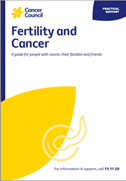- Home
- Testicular cancer
- Managing side effects
- Long-term side effects
- Effects on fertility
Effects on fertility
Some people find that their fertility is affected by treatment for testicular cancer. Learn how treatment can affect fertility, and ways to manage fertility changes.
Surgery – Most men who have had one testicle removed can go on to have children naturally. Men who have both testicles removed (rarely required) will no longer produce sperm and will be infertile. Men who have retrograde ejaculation after a retroperitoneal lymph node dissection (RPLND) cannot conceive naturally. You may be given medicine to help the semen move out of the penis as normal or a doctor may be able to extract some sperm.
Chemotherapy and radiation therapy – Both chemotherapy and radiation therapy can decrease sperm production and cause unhealthy sperm. These effects may be temporary or permanent. It may take one or more years before there are enough healthy sperm to conceive a child.
Managing fertility changes
- Before cancer treatment starts, you may be able to collect and store some sperm. The sperm is frozen until needed. Samples can be stored for many years. Although there is a cost involved, most sperm bank facilities have payment plans to make it more affordable. Ask your cancer specialist to refer you to a fertility specialist so you can find out about your options.
- Avoid pregnancy until sperm are healthy again by using contraception during and after chemotherapy or radiation therapy for about 6–12 months, or as advised by your doctor. You may need a sperm analysis test to show this.
- If infertility appears to be permanent, talk to a counsellor or family member about how you are feeling. Infertility can be very upsetting for you and your family, and you may have many mixed emotions about the future.
For more on this, call Cancer Council 13 11 20, see Fertility and cancer.
→ READ MORE: Effects on body image
Podcast: Sex and Cancer
Listen to more of our podcast for people affected by cancer
More resources
Dr Benjamin Thomas, Urological Surgeon, The Royal Melbourne Hospital and The University of Melbourne, VIC; A/Prof Ben Tran, Genitourinary Medical Oncologist, Peter MacCallum Cancer Centre, Walter and Eliza Hall Institute of Medical Research and The University of Melbourne, VIC; Dr Nari Ahmadi, Urologist and Urological Cancer Surgeon, Chris O’Brien Lifehouse, NSW; Helen Anderson, Genitourinary Cancer Nurse Navigator, Gold Coast University Hospital, QLD; Anita Cox, Youth Cancer – Cancer Nurse Coordinator, Gold Coast University Hospital, QLD; Dr Tom Ferguson, Medical Oncologist, Fiona Stanley Hospital, WA; Dr Leily Gholam Rezaei, Radiation Oncologist, Chris O’Brien Lifehouse and Royal Prince Alfred Hospital, NSW; Dheeraj Jain, Consumer; Amanda Maple, 13 11 20 Consultant, Cancer Council SA; Jessica Medd, Senior Clinical Psychologist, Department of Urology, Concord Repatriation General Hospital and Headway Health, NSW.
View the Cancer Council NSW editorial policy.
View all publications or call 13 11 20 for free printed copies.

